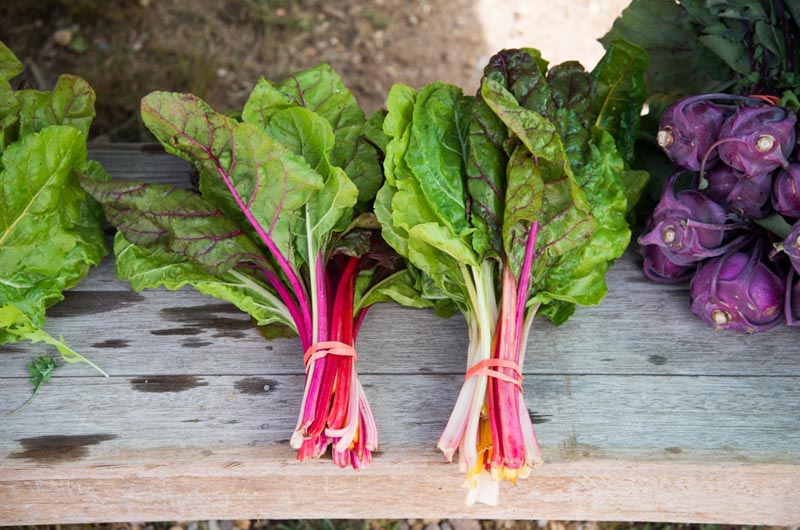Among the mounds of lettuce heads, cartons of fresh fruit, herb displays and coolers of local meat, vendors at the West Tisbury Farmers’ Market are offering something new this summer: acceptance of government-issued food coupons.
This season, three separate government-run food aid program benefits will be accepted at the local farmers’ market held on Saturdays and Wednesdays at the Grange Hall in West Tisbury.
The idea was first introduced at a meeting last year by Jan Buhrman, who runs a booth for Kitchen Porch Catering. But vendors at the market soon realized that the United States Department of Agriculture’s Supplemental Nutrition Assistance Program, also called SNAP, must work directly with a non-profit. Since Ms. Buhrman’s business is for-profit, she had to step away from the project. Since then, Lily Walter of Slip Away Farm, Jon Previant of the Farm Institute and Meeghan Athearn of Morning Glory Farm have taken the lead.
Currently, two of the three programs’ coupons are accepted at the three farm booths — the Special Supplemental Nutrition Program for Women, Infants and Children, also called WIC; and the Senior Farmers’ Market Nutrition Program, often referred to as SFMNP or simply “the senior’s program.”
Pending certifications, Black Water Farm, Down Island Farm, Ghost Island Farm, Whippoorwill Farm and Mermaid Farm will also accept WIC and SFMNP money, Ms. Walter said.
Individuals who qualify for both WIC and SFMNP receive paper coupons from the government by mail and can use them at any of the eligible farmers’ market vendors. The coupons act as cash, but customers are not allowed to receive change, Ms. Walter said. At the end of the season, vendors get reimbursed after mailing in their collected coupons.
WIC coupons can be used to purchase only fruits, vegetables and cut herbs. SFMNP coupons can also be exchanged for those items, as well as honey. SNAP money, which may be approved later this month, can be used for dairy, fruits, vegetables, meats, eggs, seeds and plants, Ms. Walter said.
It’s a development that mirrors similar movements going on in Massachusetts and nationwide, offering low-income people the opportunity to buy fresh and locally grown produce while at the same time expanding the customer base of farmers’ markets. The process to be certified — a phone interview — was not difficult, Ms. Walter said.
Thus far, though, the program has not seen much momentum.
“Nobody has used them yet,” Ms. Walter said. She cited lack of awareness as an issue. “We just haven’t been able to get the word out.”
But she’s hopeful. And with the addition of SNAP benefits, Ms. Walter thinks customers will gain a wider knowledge of food aid assistance possibilities on Martha’s Vineyard.
SNAP benefits, formally known as the Food Stamp Program, is the largest domestic food assistance program nationwide, according to the USDA’s website. Getting the farmers’ market set up to accept SNAP benefits is not as easy as accepting WIC and SFMNP benefits, Ms. Walter said.
Mr. Previant at the Farm Institute volunteered to finish the paperwork in order for the farmers’ market to accept SNAP benefits. “We’re a non-profit and we’re happy to step forward to provide the paperwork that the government requires,” he said.
Rather than paper coupons, SNAP money is transferred through an electronic benefit transfer (EBT) system, which authorizes the transfer of benefits through a FD400 terminal machine. Customers can use their EBT card, which acts as a debit card, to gain wooden nickels, each one worth five dollars.
Ms. Athearn, who has also been actively involved in implementing a system to accept SNAP money, already has the wooden nickels for when the system arrives. “We really just need the machine,” she said this week. The machine will be set up at the Morning Glory Farm booth on Wednesdays and at the Slip Away Farm booth on Saturdays.
At the end of each market day, Ms. Walter and Ms. Athearn will total up tokens “cashed-in” from farmers to track the amount of money for reimbursement. It’s a time-consuming task, but Ms. Walter said it’s not a concern.
The biggest hurdle, Mr. Previant said, has been the paperwork needed to obtain the machine and the communication between the banks and Massachusetts Department of Agriculture. The process, he said, has been plagued with red tape, technical difficulties and inefficiencies. But once the machine has been received, which Mr. Previant believes will be later this month, it will be worth it, he said.
Mr. Previant said he received an email dated July 9 from the MDAR that said his paperwork was received and that it would take 10 business days plus shipping time to receive the terminal.
“We raise good food of all sorts and we would like to get it in the hands of people who need it and we want to help other people at the market do the same, that’s all we’re trying to do,” Mr. Previant said. “Everyone at the farmers’ market has been very patient,” he added.
“We just want healthy fresh produce to be available to people regardless of their age or where they live or their income,” said Ms. Athearn.
“This is another step towards change,” she added. “I love food and I love people and I love eating and talking about food and providing people with good nourishment. We’re almost there.”









Comments (6)
Comments
Comment policy »